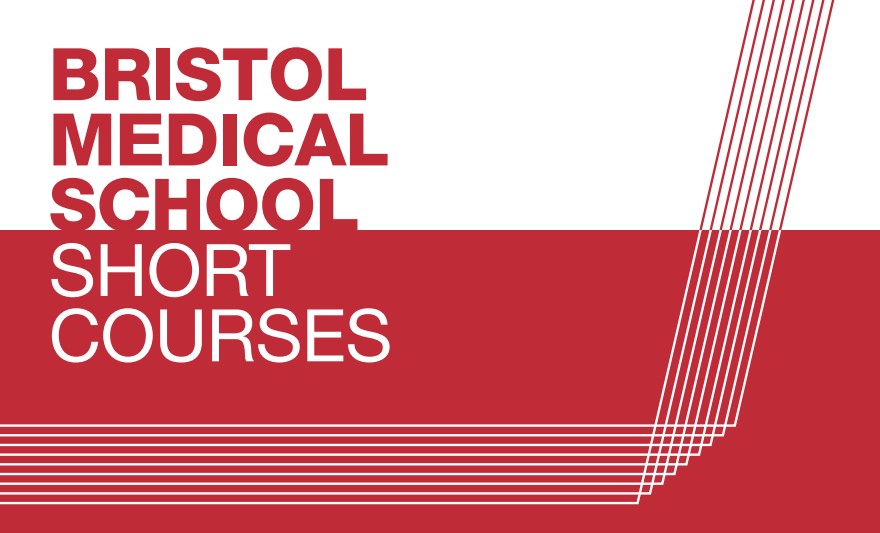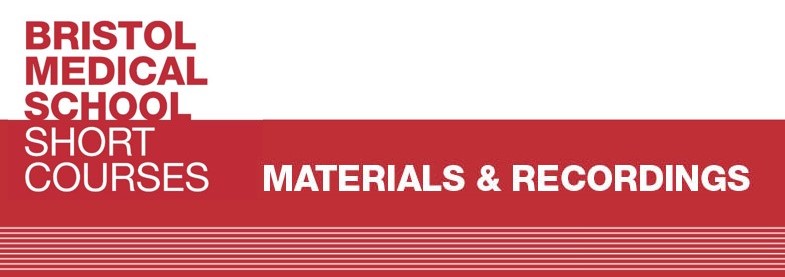Causal Inference in Epidemiology: Concepts and Methods
Causal inferences from observational studies rely on assumptions, some of which we cannot test using the data. Therefore it is important to learn the rules of Directed acyclic graphs (DAGs) as a way to document these assumptions. Academics working in the MRC Integrative Epidemiology Unit (IEU) and the University of Bristol (including those who are tutors on this course) have been at the forefront of developing and applying methods to assess causal inference.
| Dates | 30 June - 3 July 2025 |
|---|---|
| Fee | £880 |
| Format | Online |
| Audience | Open to all applicants (prerequisites apply) |
 Course profile
Course profile
This course aims to define causation in biomedical research, describe methods to make causal inferences in epidemiology and health services research, and demonstrate the practical application of these methods.
Please click on the sections below for more information.
Structure
This 4-day course will run online and will consist of a mixture of lectures, small group work and computing practicals. Participants are encouraged to do the computing practicals on their own computer in breakout rooms with the help of a tutor. All sessions will be live.
Intended Learning Objectives
By the end of the course participants should:
- have a thorough understanding of the potential (counterfactual) outcomes approach to defining causal effects;
- be able to implement Directed Acyclic Graphs (DAGs) to document assumptions and inform analysis plans;
- understand the key sources of bias in analyses of observational data, and how to investigate them using DAGs; and
- appreciate key methods which can be used to estimate causal effects, and understand the assumptions underlying them.
Target audience
This course is aimed at epidemiologists, statisticians and other quantitative researchers. Applicants must have knowledge and experience of a variety of linear and logistic regression models and their implementation in Stata or R, to beyond the level achieved in the Introduction to Linear and Logistic Regression Models course.
Familiarity with survival analysis is recommended.
We recommend that you do not attend this course in the same year that you have attended Introduction to Linear and Logistic Regression Models.
Outline
This course will introduce participants to concepts of and methods for, causal inference in epidemiological research, with a focus on their application.
The course will cover:
1. potential (counterfactual) outcomes;
2. causal diagrams (DAGs);
3. confounding and methods to control for confounding (stratification, regression, propensity scores and inverse probability weighting);
4. selection and information biases;
5. model selection;
6. instrumental variable estimation, including analysis of Mendelian randomization studies;
7. time-varying confounding, marginal structural models and other g-methods;
8. intention-to-treat and per-protocol effects in randomized trials;
9. emulating a randomized trial using observational data;
10. study designs for causal inference; and
11. triangulation.
Teaching staff
The teaching faculty for this course include:
Professor Jonathan Sterne
Professor Kate Tilling
Professor Deborah Lawlor
Professor Abigail Fraser
Dr Tom Palmer
Dr Paul Madley-Dowd
Dr Kate Birnie
Dr Rosie Cornish
Dr Amy Taylor
Dr Raquel Granell
Dr Venexia Walker
Dr Ana Goncalves Soares
Dr Chin Yang Shapland
Dr Daisy Gaunt
Prerequisites
To make sure the course is suitable for you and you will benefit from attending, please ensure you meet the following prerequisites before booking:
| Knowledge |
Applicants must have knowledge and experience of a variety of linear and logistic regression models and their implementation in Stata or R, to beyond the level achieved in the Introduction to Linear and Logistic Regression Models course. Familiarity with survival analysis is recommended. |
|---|---|
| Software |
You must have either Stata* (version 14, 15, 16, 17 or 18) or R installed in advance of the course. We recommend running this through RStudio Desktop or Posit Cloud**. *Internal University of Bristol participants are given access to Stata. Go to Stata Installation Instructions (internal only) for help setting it up before the start of the course. External participants are responsible for providing their own access to Stata, however if you are an employee of a university or another institution you may be able to get a short term free Evaluate license. If you are a student, Stata offer a short term free Student licence (one week). **A link to create an account and access Posit Cloud will be provided. |
Bookings
Before booking this course, please make sure you read the information provided above about the target audience and prerequisites. It is important that you have access to the relevant IT resources needed for the course and meet the knowledge prerequisites to ensure you can get the most from the course.
Bookings are taken via our online booking system, for which you must register an account. To check if you are eligible for free or discounted courses please see our fees and voucher packs page. All bookings are subject to our terms & conditions, which can be read in full here.
For help and support with booking a course refer to our booking information page, FAQs or feel free to contact us directly. For available payment options please see: How to pay your short course fees.
Course materials
Participants are granted access to our virtual learning platform (Blackboard) 1 to 2 weeks in advance of the course. This allows time for any pre-course work to be completed and to familiarise with the platform.
To gain the most from the course, we recommend that you attend in full and participate in all interactive components. We endeavour to record all live lecture sessions and upload these to the online learning environment within 24 hours. This allows course participants to review these sessions at leisure and revisit them multiple times. Please note that we do not record breakout sessions.
All course participants retain access to the online learning materials and recordings for 3 months after the course.
University of Bristol staff and postgraduate students who do not wish to attend the full course may instead register for access to the 'Materials & Recordings' version of this course: Further information and bookings.
Testimonials
100% of attendees recommend this course*.
*Attendee feedback from 2024.
Here is a sample of feedback from the last run of the course:
"Excellent course-- the learning materials and organization of the course were overall exceptional and made for a very smooth experience. Thank you!" - Course feedback, July 2024.
"Generally I felt the teaching was at a high quality. The introduction of concepts with clear definition, and then the use of examples to bring these to life, worked very well." - Course feedback, July 2024.
"I liked the flexibility of the lecturers to answer questions in the chat as they were talking. This is not easy. The course tutors were extremely knowledgable and clearly knew their stuff." - Course feedback, July 2024.
"Jonathan and Kate are the most incredible teachers - they make the most complex concepts incredibly clear, and go at the right pace, with great examples." - Course feedback, July 2024.
"Lectures were incredibly informative and practicals were great opportunities to actively apply knowledge from these lectures." - Course feedback, July 2024.
"Nice variety of lecturers and comprehensive overview of topics, which were reiterated throughout. I liked the mix of computer and pen and paper practicals." - Course feedback, July 2024.
"This course has opened my eyes up to the large range of different biases and different issues that can occur if you do not plan your research and analyses correctly. After taking this course, I will now be much more vigilant with my research." - Course feedback, July 2024.
"This course up skilled me tremendously. I will be using DAGs in my future research as well as using many of the techniques to adjust for confounding." - Course feedback, July 2024.
"This has genuinely been the most enlightening and inspiring course i have ever been on. I have learnt so much - causal inference makes so much more sense now! I leave feeling way more confident about the concepts, and will from now on draw DAGS and Create target trials for (almost) everything." - Course feedback, July 2024.
"Very nice flow between getting an overview of methods and the practical application of the advanced methods (sequential trials etc.) Clear explanations. Enthusiasm of tutors evident." - Course feedback, July 2024.
 Bookings are currently closed.
Bookings are currently closed.
You will be able to register with our booking system from midday 17 September 2024. Bookings will be accepted from midday 8 October 2024.
This has genuinely been the most enlightening and inspiring course i have ever been on. I have learnt so much - causal inference makes so much more sense now! I leave feeling way more confident about the concepts, and will from now on draw DAGS and Create target trials for (almost) everything.
 Dates don't work? Just need a refresher?
Dates don't work? Just need a refresher?
Find out about the self-paced Materials & Recordings version of this course [UoB only].